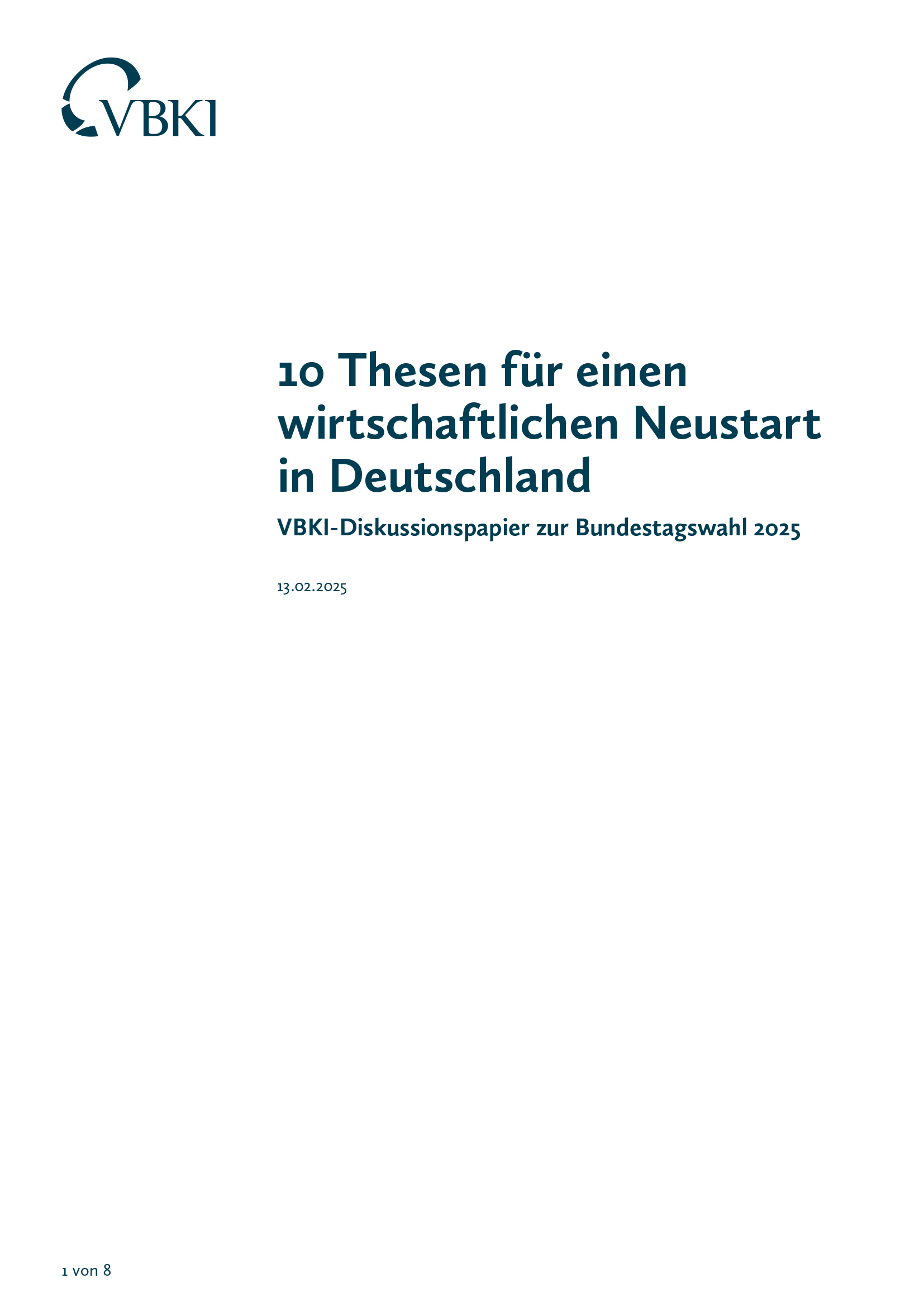FEDERAL ELECTION 2025
10 theses for a new economic start in Germany
Germany is not getting off the ground, the economy is in a deep crisis: after two years of stagnation, current forecasts suggest that the current year is likely to bring at best a mini growth - if at all. According to the OECD, however, the eurozone will achieve growth of 1.3 percent - despite the considerable braking effect of its largest economy.
The reasons for this negative trend are as varied as they are well-known: An acute shortage of labour and skilled workers, an outdated infrastructure, high energy and wage costs, a lack of digitalization and an education system that is barely competitive internationally. Added to this is an excessive density of regulation that now exceeds all standards: according to an ifo study, Germany loses up to 146 billion euros in economic output per year due to bureaucracy alone.
However, the crisis is not only the result of unfavorable framework conditions; business and entrepreneurship must also ask themselves questions: In times of far-reaching transformations, have business models that were once successful but are now outdated not been held on to for too long?
"We urgently need a liberating blow: less regulation, more investment, faster decision-making processes. If we want to maintain our prosperity, the next federal government must set the course for growth. This requires the political will for real reforms."
VBKI President Markus Voigt
In the run-up to the Bundestag elections on February 23, 2025, the Verein Berliner Kaufleute und Industrieller (VBKI), with the help of its committees developed ten theses for a new economic start. The paper does not claim to describe a comprehensive growth agenda. Rather, its aim is to use suggestions and recommendations in key areas of reform to refocus the public debate on the economy - particularly in light of an election campaign dominated by migration issues. Without economic growth, neither the failures of the past can be made up for nor the challenges of the future overcome.
So what can be done? Many of the brakes on growth are home-made - and can be solved by our own efforts. In addition to political will, the decisive factor for the necessary course corrections is the social realization that simply "business as usual" is not enough. Bold, far-reaching and certainly painful reforms require the broadest possible social support. However, confidence in the state's ability to solve problems is currently at an all-time low: according to a recent Forsa survey, 70% of citizens believe the state is overburdened. Against this backdrop, political decision-makers are likely to find it all the more difficult to sound out the limits of what is reasonable when it comes to reforms.
Nevertheless, anyone who wants to take responsibility for the future of our country must place economic renewal at the heart of their government's actions. In view of limited public funds, measures on a future reform agenda should be consistently prioritized according to whether they will lead Germany back onto a sustainable growth path.
Our 10 theses
1. modernization of the state: efficiency as the basis for political action
Germany has become accustomed to a measure-driven policy mode. The problem is that people rarely ask what problem a measure is supposed to solve and almost never check whether a measure has actually had the desired effect. German politics is oriented towards input legitimacy instead of output legitimacy. The result is an excess of bureaucracy and a lack of willingness to tackle major reforms. If the state is to regain its ability to act, the current political mode must be turned on its head. A clear definition of objectives and expected results as well as ongoing evaluation and adjustment of measures are a matter of urgency: what works will be expanded, ineffective approaches will be discontinued. This transparency would set priorities and show that "the state" cannot do everything at the same time, while at the same time creating space for non-state actors, who are often better implementers.
2. simplify legislation: Less complexity, more digitalization
Justice does not necessarily mean justice in individual cases. This is because the state's claim to do justice to every concern in its individual form leads to ever more detailed laws, regulations and standards. Decisions are being shifted from the political to the legal sphere. This increasing legalization leads to more bureaucracy, slows down government action and reduces confidence in its efficiency. Instead of focusing on justice in individual cases, government action should once again be more strongly oriented towards the legitimate expectation of the general public that decisions should be made swiftly and in the well-understood interests of the common good. This requires generally applicable regulations that focus on simplification and standardization.
In addition, a simplified set of laws and regulations reduces bureaucracy, can be digitized more easily and thus reduce administrative costs. This creates space for innovation. At the same time, responsibilities must be defined more clearly so that decision-making processes are not delayed by conflicts of responsibility.
3. reduce location costs: more competitiveness, more investment
Germany's competitiveness is coming under increasing pressure - energy-intensive industry in particular is struggling with high location costs. Since the last peak in 2017, the Federal Statistical Office has recorded a steady decline in production, threatening a creeping deindustrialization. A competitive business location therefore requires a fundamental reduction in location costs. This includes tax relief for companies to an internationally competitive level, a reduction in electricity tax and grid fees, as well as a cap on social security contributions. At the same time, the taxation of reinvested profits and depreciation options should be optimized in order to bind companies to the location in the long term.
4 Artificial intelligence as a growth driver: industry as a German opportunity
Germany has all the prerequisites to play a pioneering role in the development of AI applications for industry. While other regions of the world were the inspiration for the major language models, Germany could contribute its strength as an industrialized country to the development of AI solutions for industrial production. However, in order to make effective use of this locational advantage, there is an urgent need for secure and interoperable data spaces that facilitate the exchange between companies and provide high-quality, industry-relevant data. Public-private partnerships could interlink research and application in order to secure the competitiveness of German industry. A uniform interpretation of the EU regulation on AI, keyword AI Act, throughout Europe is also essential. Research institutions should cooperate more closely with companies in order to jointly develop marketable applications. In addition to infrastructure, greater support for education and training in AI-relevant professions is also crucial in order to secure the skilled worker base and accelerate the innovation process. Reliable, safe and trustworthy industrial AI "Made in Germany" - an opportunity that Germany should seize.
5. secure the research industry: Facilitate access to data
Lengthy procedures and strict data protection regulations are slowing down research in Germany considerably. In an international comparison, Germany is lagging behind, as other nations provide researchers with much easier access to relevant data. Take the healthcare system, for example: countries with an advanced degree of digitalization in their healthcare systems, such as Israel or Denmark, achieve high recruitment figures for studies more easily and quickly. In countries such as Israel or Denmark, an understanding of the differentiation between data security, i.e. protection against misuse, and data protection in terms of patient protection facilitates access to research data. This is also reflected in the number of clinical studies conducted by pharmaceutical companies. According to the German Association of Research-Based Pharmaceutical Companies, Germany was in second place worldwide in 2015 after the USA with just under 700 studies - in 2023, it was only in fourth place with just under 500 studies. The coalition government had initiated a research data law, which was not pursued further due to the early elections. The new government should pick up the ball and drive the project forward quickly. Obstructive data protection must no longer be allowed to block research potential. Without rapid progress in research, Germany risks losing ground internationally.
6. transforming knowledge into added value: More transfer, more spin-offs
Achieving economic and social transformation requires a large number of technological and social innovations. The EFI Report 2024 calls for long-term strategic goals to be linked with measures that can be implemented in the short term, such as real laboratories or simplified IP transfer. In terms of innovation policy, the SPRIND Freedom Act was the right step to promote research projects and start-ups more quickly and with less bureaucracy. However, projects such as the German Agency for Transfer and Innovation have so far only been implemented in the form of individual pilot projects. The "Startup Factories" lighthouse competition, which aims to establish nationally and internationally visible start-up centers, is also an important measure that must be implemented as quickly as possible.
On the university start-up side, the financial framework conditions need to be improved: A government initiative to promote venture capital investments in university start-ups could reduce the risk for investors and facilitate access to capital. Existing public investment funds must be expanded to encourage co-investments and enable the financing of prototyping and pilot series. Tax incentives for research-intensive university start-ups could encourage founders to turn their ideas into marketable products and use funding specifically for this purpose.
7. rethinking education: scaling successful approaches instead of constantly reinventing them
An education system that does not meet the requirements of the future is a burden on society and the economy - especially in a country that thrives on its ability to innovate. According to the IQB education trend, more than 20 percent of pupils in Germany do not achieve the required basic language and mathematical skills in elementary school. In addition, according to the National Education Report, around 7% of young people leave school without any qualifications - a trend that is unacceptable in a highly developed country like Germany. This not only results in individual educational gaps, but also exacerbates the shortage of skilled workers.
Total public spending on education in Germany amounts to 4.57% of GDP (2021), which puts Germany - albeit just below the OECD (4.91%) and EU (4.85%) averages. Countries such as Norway, the United Kingdom and Israel invested more than 6% of their GDP in education in 2021, while the USA, Australia, Chile and a number of European countries each spend more than 5% of their GDP on education.
In addition to a corresponding adjustment of education spending, a reform should primarily address the efficiency of the education system. In addition to a stronger focus on performance, part of the necessary course correction could consist of being guided by successful best practices: Educational projects that have proven to be successful in individual federal states should be applied nationwide. Greater standardization of the education system on this basis should be conducive to the quality of education and increase overall system efficiency.
Artificial intelligence can also open up new opportunities in the classroom - for example, when it comes to tailoring teaching content to the needs of higher and lower-performing pupils. The establishment of a federal institute for the development of innovative educational approaches could coordinate and accelerate such processes.
8. infrastructure: accelerate planning and approval
A functioning infrastructure is the cornerstone of a strong economy. But while Switzerland, for example, invests almost 500 euros per capita in rail infrastructure alone, the figure in Germany is only 115 euros. The result: the investment backlog is growing. The Cologne Institute for Economic Research (IW Köln) estimates that over 300 billion euros will be needed over the next 10 years to maintain and expand public infrastructure. In addition to higher investments, tenders and approval procedures must be considerably shortened and simplified. Digital workflows, geo-referenced application procedures and working with approval fictions could bring decisive progress here. Better maintenance of existing infrastructure is also required in order to avoid long-term failures. In addition, the authorities need to work more closely together to avoid redundant checks and delays.
9. more speed in housing construction: creating uniform standards
Housing construction is lagging behind the population's needs: instead of the 400,000 new homes per year targeted by the German government, only 200,000 homes were completed in 2024. In order to reduce construction costs and speed up the construction process, the state building regulations need to be standardized according to the "best of" principle. As a first step, all current standards should be reviewed to see whether they can be lowered without compromising the comfort and safety of the home. Successful regulations from individual federal states should serve as a model for a Germany-wide standard. The Berlin Faster Construction Act is an example of how approval processes can be made more efficient. Housing construction in areas with shortages should be in the "overriding public interest" and be included as a priority concern, similar to the Renewable Energy Sources Act for renewable energies, in the consideration of protected goods to be carried out in each case. This could reduce obstacles and facilitate the construction of urgently needed housing.
10 Shaping Europe pragmatically: Less regulation, more economic dynamism
The European single market offers numerous economic opportunities. However, the continuous introduction of new regulations - on average more than one new piece of legislation per day - is hampering growth and investment. Germany in particular tends not only to implement European requirements, but also to tighten them further with additional national rules. This over-regulation hinders entrepreneurial freedom and slows down innovation.
Instead of further expanding bureaucracy, Germany, as Europe's largest economy, must once again take on a more active role in European policy. Closer Franco-German coordination can further develop the single market in a targeted manner by removing remaining barriers to trade and creating uniform standards. With its 27 states and almost 450 million people, the European single market is the largest common market in the world - but for companies it often feels like 27 individual markets with different requirements. This makes it difficult to scale up innovations, while economic areas such as the USA consistently exploit this advantage.
Germany is at a crossroads. While the signs are pointing to growth both globally and in the eurozone, Europe's largest economy is treading water. As a result, public revenues are falling, the scope for political action is shrinking and prosperity - and therefore social stability - is under threat.
The ten theses formulated in this discussion paper should therefore also be seen as an appeal to the future German government to present a reform agenda as quickly as possible that will enable the country to make a new economic start in the midst of increasingly fierce global competition. The basis for such a new start is a catalog of measures that gives clear priority to economic growth.
Future political decision-makers have a responsibility to consistently focus reforms on securing growth and competitiveness. This requires investment in education, research and infrastructure as well as a streamlined bureaucracy, more efficient legislation and an innovation-friendly location policy. A strong Germany is not created by redistributing shrinking resources, but by the ability to create new value. This is the only way we can secure the prosperity of future generations and remain capable of acting in the long term.
10 theses for a new economic start in Germany
You can download the VBKI discussion paper on the 2025 federal elections here.
Download >
10 theses for a new economic start in Germany
You can download the VBKI discussion paper on the 2025 federal elections here.
Download >
Contact person

Sebastian Thomas
Head of Communication & Marketing
Phone: 030 - 72 61 08 - 17
sebastian.thomas@vbki.de

Philipp Zettl
Project manager Policy
Phone: 0151 - 74 37 43 92
philipp.zettl@vbki.de






